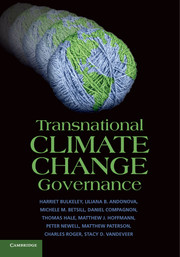Book contents
- Frontmatter
- Contents
- List of Figures and Tables
- Acknowledgements
- Acronyms and Abbreviations
- 1 Introducing Transnational Climate Change Governance
- 2 Mapping the World of Transnational Climate Change Governance
- 3 Theoretical Perspectives on Transnational Governance
- 4 Origins, Agency and the Forms of Transnational Climate Change Governance
- 5 Constructing Transnational Climate Change Governance Issues and Producing Governance Spaces
- 6 The Uneven Geography of Transnational Climate Change Governance
- 7 Understanding Authority and Legitimacy in Transnational Climate Change Governance
- 8 Making a Difference? Tracing the Effects and Effectiveness of Transnational Climate Change Governance
- 9 Conclusions – Looking Beyond Transnational Climate Change Governance
- References
- Index
3 - Theoretical Perspectives on Transnational Governance
Published online by Cambridge University Press: 05 August 2014
- Frontmatter
- Contents
- List of Figures and Tables
- Acknowledgements
- Acronyms and Abbreviations
- 1 Introducing Transnational Climate Change Governance
- 2 Mapping the World of Transnational Climate Change Governance
- 3 Theoretical Perspectives on Transnational Governance
- 4 Origins, Agency and the Forms of Transnational Climate Change Governance
- 5 Constructing Transnational Climate Change Governance Issues and Producing Governance Spaces
- 6 The Uneven Geography of Transnational Climate Change Governance
- 7 Understanding Authority and Legitimacy in Transnational Climate Change Governance
- 8 Making a Difference? Tracing the Effects and Effectiveness of Transnational Climate Change Governance
- 9 Conclusions – Looking Beyond Transnational Climate Change Governance
- References
- Index
Summary
Introduction
The TCCG data and patterns presented in Chapter 2 reveal that the phenomenon of TCCG is characterised by significant diversity. Multiple kinds of actors are operating across various scales, in different regions, and are seeking to mobilise a wide range of discourses, tools, techniques and practices in order to govern. Looking at this landscape, some intriguing puzzles arise in terms of the actors involved in the emergence and diffusion of TCCG, the substantive issues around which activity is clustered, its uneven geographies, patterns of legitimacy and authority, each of which warrants further explanation.
To date, however, the theorisation of transnational politics has mostly been concerned with accounting for the impact of transnational relations on the behaviour of states within the international arena and has yet to address these issues in significant detail. In the rest of this chapter, we develop a novel theoretical approach for analysing TCCG. We begin by examining extant theories of transnational politics. In doing so, we find that they regard transnational relations as a singular, relatively uniform phenomenon, and all too frequently employ a single epistemological framework. In contrast, we seek to account for the multiple forms, functions and clustering of transnational governance in order to answer the range of questions concerning why, how and for whom TCCG is being pursued. Further, in order to be able to explore this diversity adequately, we argue that it is advantageous to bring to bear a range of theoretical perspectives that can illuminate the different dimensions of TCCG. The second section of the chapter thus introduces three broad theoretical lenses that guide our approach to each of the empirical puzzles identified in the last chapter. We term these three lenses agency-based, social and system dynamics and critical political theory on the basis of their common orientations towards particular forms of explaining the social world.
- Type
- Chapter
- Information
- Transnational Climate Change Governance , pp. 38 - 60Publisher: Cambridge University PressPrint publication year: 2014
- 1
- Cited by



